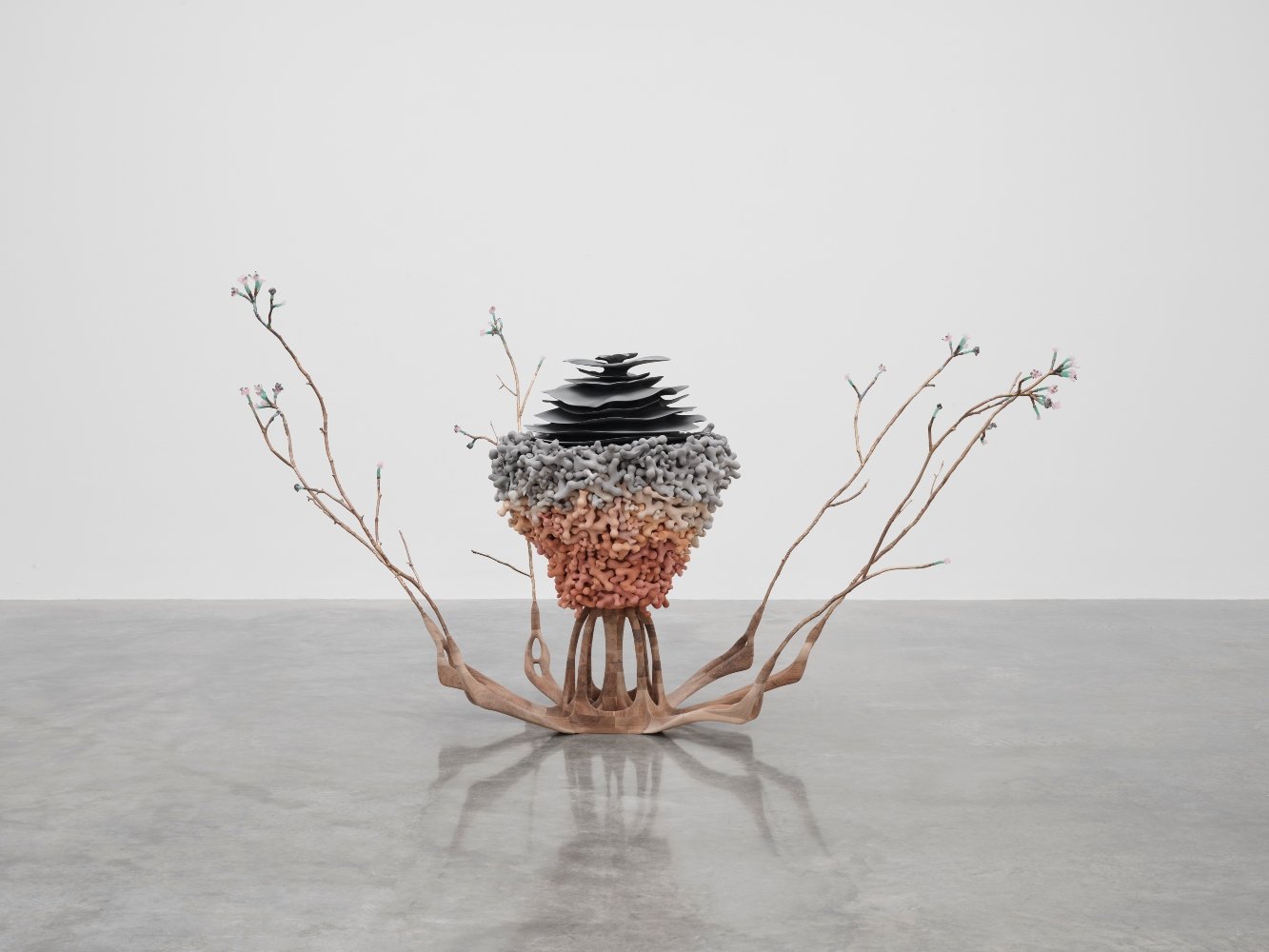
The very name “artificial intelligence” tends to position these technological developments in opposition to the natural world. Offering a fresh perspective, the French London-based artist Marguerite Humeau has reimagined A.I. as a type of collective intelligence like the one shared by ants, termites, or bees.
Humeau has tested out the idea by collaborating with A.I. to help create the video work Collective Effervescence (2023) and a ceramic mural for “meys,” her solo exhibition at White Cube Bermondsey in south London, which runs until May 14.
The show is inspired by eusocial insects, which manage to pull-off incredible feats of engineering comparative to their size and individual ability thanks to their instinct for cooperation. Each of these strange but sophisticated artworks are, in some way, the result of the “hive mind.” They prompt viewers to consider what we humans might hope to learn from these seemingly insignificant pests.
“There are forms of life that will survive us, how can we take them as our guides or companions to understand how to navigate our own futures?” Humeau has asked.
In the exhibition’s first room, we see Humeau resurrect and build on intelligence from the past, in this case that of the Polish artist Adam Kossowski who made a large mosaic for the Peckham Civic Centre, also in south London, in 1965. His work, The History of the Old Kent Road, is now scheduled for demolition, but Humeau has decided to give it an update with an A.I. twist by enlisting the help of the GPT3 algorithm to create a new, post-apocalyptic vision of the city. This is displayed in a series of hand-sculpted tiles or “fragments.”
Marguerite Humeau, The History of Old Kent Road (Post-Kossowski) Fragments I–V (2023). Photo courtesy of White Cube.
Marguerite Humeau, The History of Old Kent Road (Post-Kossowski) Fragment XI (2023). Photo courtesy of White Cube.
In Kossowski’s original mural, a single Camberwell Beauty butterfly can be spotted by the more attentive viewers. In Humeau’s version, this insect appears in a large swarm, reminding us that the end of the world for humans may offer other populations the opportunity to regenerate.
The film Collective Effervescence is a study of the harmoniously choreographed behavior of termites living within a mound, capturing the excitement of their shared vitality. Just as humans farm, these insects must create and cultivate a fungus garden as a communal source of food. Once again, Humeau has used OpenAI’s popular A.I. text-to-image generator DALL-E to generate images that fantasize about this process as a ritualistic dance.
Marguerite Humeau, Collective Effervescence (2023). The artist generated this image in part with DALL-E, OpenAI’s image-generation model. Photo: © Marguerite Humeau.
Marguerite Humeau, Collective Effervescence (2023). The artist generated this image in part with DALL-E, OpenAI’s image-generation model. Photo: © Marguerite Humeau.
Marguerite Humeau, Collective Effervescence (2023). The artist generated this image in part with DALL-E, OpenAI’s image-generation model. Photo: © Marguerite Humeau.
Elsewhere in the show, Humeau explores more traditional forms of collaboration and interdependence by working with collectives of craftspeople with a complementary variety of skills. Each specializing in a different kind of material—including, glass, terracotta, wax, and wood—they have worked together on a series of highly intricate sculptures with forms that were clearly inspired by the organic world. These fantastical “totems” or “Guardians,” staged within a dimly lit gallery space, bring to mind the layered branches of coral, the repeat grooves of a mushroom or the porous surface of honeycomb.
Check out some of these works below.
Installation view of Marguerite Humeau’s exhibition “meys” at White Cube Bermondsey. Photo: Ollie Hammick, © White Cube.
Installation view of Marguerite Humeau’s exhibition “meys” at White Cube Bermondsey. Photo: Ollie Hammick, © White Cube.
Installation view of Marguerite Humeau’s exhibition “meys” at White Cube Bermondsey. Photo: Ollie Hammick, © White Cube.
Installation view of Marguerite Humeau’s exhibition “meys” at White Cube Bermondsey. Photo: Ollie Hammick, © White Cube.
Installation view of Marguerite Humeau’s exhibition “meys” at White Cube Bermondsey. Photo: Ollie Hammick, © White Cube.
“meys” is on view at White Cube Bermondsey, 144-152 Bermondsey St, London, through May 14.
More Trending Stories: